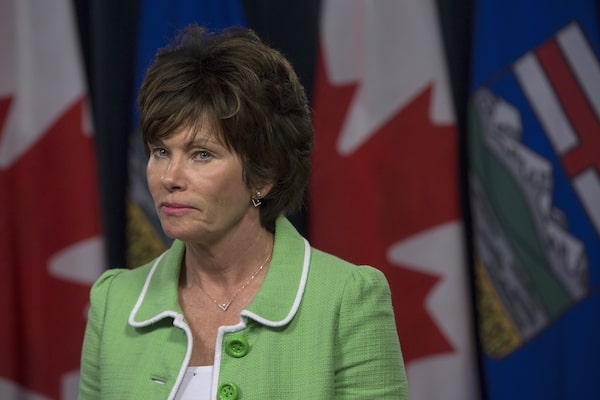
Alberta enery minister Sonya Savage listens while Premier Jason Kenney speaks in Edmonton on June 18, 2019. Ms. Savage said that with delays in pipeline approvals such as Enbridge’s Line 3 replacement, oil production levels could exceed rail and pipeline capacity by 150,000 barrels per day.AMBER BRACKEN/The Canadian Press
The government of Alberta said on Tuesday it was extending mandatory curtailments on crude production by an extra year through 2020, because of uncertainty about when expanded pipelines may come online.
Alberta’s previous New Democratic Party government imposed production limits in January to drain a glut of oil in storage that built up owing to congested pipelines. The curtailments have dramatically reduced a painful discount on Canadian heavy crude, but investor confidence remains shaken and energy stocks are trading around historic lows.
Premier Jason Kenney’s United Conservative Party government, which took office in the spring, has steadily eased curtailments as inventories drained.
But Alberta Energy Minister Sonya Savage said that with delays in pipeline approvals such as Enbridge Inc.’s Line 3 replacement, production levels could exceed rail and pipeline capacity by 150,000 barrels a day (b/d), and greater price discounts could reappear, unless the province extended curtailments.
“We’re doing this because we have to. In the short term, we don’t have the capacity to move the production,” Ms. Savage told reporters in Calgary.
The government also said it would raise the exemption in the curtailment formula for all oil producers to 20,000 b/d from 10,000 b/d, effective in October. The move means that curtailment will apply to only 16 of Alberta’s 300 oil producers, down from 29 companies currently.
In October, oil production will rise slightly to 3.79 million b/d from 3.76 million in September, Ms. Savage said.
Ms. Savage said it was possible that curtailment might end earlier, depending on market conditions, but that extending it for now gave the province greater flexibility.
Pipeline projects have run into fierce opposition in Canada and the United States, causing regulatory and court delays lasting years. Activists oppose pipelines as a way of strangling expansion of the Canadian oil sands, which they say are especially harmful to the environment.
Alberta’s biggest producers, including Canadian Natural Resources Ltd. and Suncor Energy Inc. urged the provincial government in July to allow expanded production as greater rail capacity to ship it became available.
Ms. Savage said she had not ruled out the idea, but was not ready to make a decision.
She said she intended to announce monthly revisions to curtailment levels 60 days in advance, instead of 30 days previously, to help producers plan.
Alberta is not changing the overall methodology that it uses to determine each company’s production limit.
Your time is valuable. Have the Top Business Headlines newsletter conveniently delivered to your inbox in the morning or evening. Sign up today.